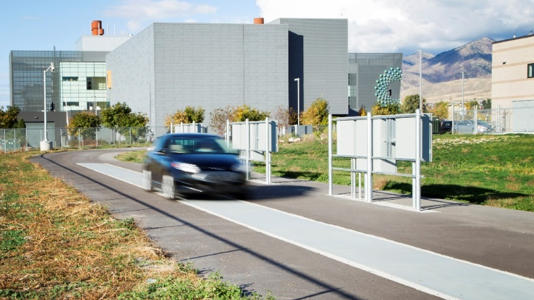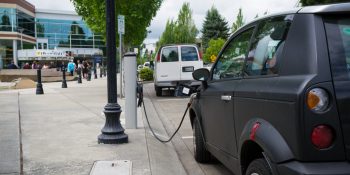Imagine never needing to stop at a gas station or wait hours while your electric car battery charges. Instead, you’d simply drive your electric vehicle, like a Nissan Leaf or Toyota Prius, and watch as your battery maintains charge. Retrofitted with a special receiver pad, your vehicle would communicate with the inductive coiled roadway beneath your car as you drove. Using the same technology to wirelessly charge a cell phone, your car’s battery would maintain charge.
Gone would be worries about how far you can drive, or finding the next charging station. The technology for this type of hassle-free driving of electric vehicles exists – and is ready to be tested further.
DOE support

To further explore the idea, a joint team composed of Colorado State University, Utah State University and Purdue University researchers, and infrastructure development firm AECOM, has been awarded $500,000 from the Department of Energy’s Advanced Research Projects Agency-Energy(ARPA-E). They received the support under the IDEAS program – Innovative Development in Energy-Related Applied Science.
The diverse team of researchers and private businesses will evaluate how best to roll out in-motion charging technology for electric vehicles, and look at the benefits from both a cost and environmental standpoint. They will use lower Los Angeles County as a test bed.
“Electric roadways could revolutionize how we think about transportation,” said CSU Energy Institute researcher and mechanical engineering assistant professor Jason Quinn. “Looking at the feasibility of adoption, cost and emissions savings will help us understand what it actually takes to implement this exciting new technology.”
Interdisciplinary methods
 Quinn is working with mechanical engineering associate professor Thomas Bradley, using detailed computer models of traffic in lower Los Angeles to evaluate the potential of the new technology. They’ll also look at the cost of implementation, and potential emission reductions once adopted.
Quinn is working with mechanical engineering associate professor Thomas Bradley, using detailed computer models of traffic in lower Los Angeles to evaluate the potential of the new technology. They’ll also look at the cost of implementation, and potential emission reductions once adopted.
ARPA-E’s IDEAS program provides rapid support of early-stage applied research to explore pioneering new concepts that have the potential to be transformative in energy technology. “This program identifies potentially disruptive concepts in energy-related technologies that challenge the status quo and represent a leap beyond today’s technology,” explains the ARPA-E website.
The project’s lead is Professor Regan Zane of Utah State University and will be initially awarded $500,000 over one year, but may be considered for future funding.
SPREAD THE NEWS
COMMENT, Like, Follow & SHARE @I70Scout
CURRENT EDITION
WEATHER & TRAFFIC PUZZLES RECENT NEWS ADVERTISE WITH US

Leave a Reply